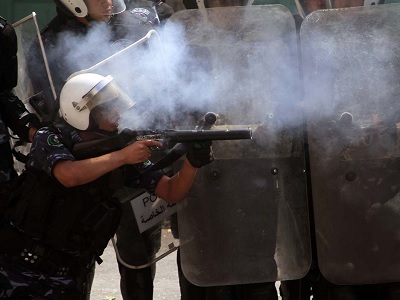
By Adnan Abu Amer
At a time when political relations are becoming increasingly strained between the Palestinians and Israelis, the two sides are looking into the future of the security coordination between them with caution and concern. This is in light of the Palestinians’ demands to end the coordination because it only serves Israel’s purposes at the expense of the Palestinians.
The Palestinian media outlets broadcasted a message by the Civil Affairs Minister and the individual responsible for the civilian and security coordination with Israel, Hussein Al-Sheikh, to PA President Mahmoud Abbas, which included the minutes of a meeting, held in Ramallah, on 9 September between Al-Sheikh and Israeli Coordinator of Government Activities in the Territories, Yoav Mordechai.
In the meeting, Mordechai praised the Palestinian security forces because “the West Bank is the only stable and calm area in the area full of security risks such as Jordan, Syria, Lebanon, Egypt and the Gaza Strip.” He also announced that Israel would allow the transfer of additional Palestinian military forces to the West Bank because it had information on the intention of some Palestinian factions to attack Israeli settlers.
The meeting also witnessed Mordechai thanking Major General Nidal Abu Dukhan, commander of the Palestinian National Security Forces (NSF), for the security intelligence on the situation in the West Bank he provides, as well as his intelligence activity in surrounding countries. However, he did complain about the weakness of the security coordination with the Palestinian Preventive Security Services, headed by Major General Ziyad Hab Al-Reeh.
It is no secret that the security coordination between the Palestinian Authority and Israel is one of the pillars of their relationship. At the height of the tension and political stalemate between the two sides, the coordination continues, perhaps because the PA believes that it is the key to remaining in the West Bank, as Israel will keep them in position in order to continue the coordination. They may believe that any breach of the coordination or attempt to back down from it would mean the beginning of the end of their existence and an implicit declaration of entering into an open confrontation with Israel. It does not seem that the PA wants this, at least not at the moment.
A few days after this security meeting, the Palestinian security forces announced on 27 September that they handed over four Israeli soldiers who accidently entered the Palestinian city of Halhul, in the south of the West bank, back to the army. Some Israelis get lost on their way back to the settlements they live in, especially at night. It has become customary for the Palestinian security forces to return any Israeli entering the PA areas, as the Oslo Accords do not allow the PA to arrest anyone holding Israeli citizenship, even if they commit a crime or security violation.
The governor of Nablus, Major General Akram Rajoub, a former officer in the General Intelligence Service, announced that the security coordination between the PA and Israel is important and is ongoing. He also confirmed the statement made by IDF Planning Directorate Chief Major General Nimrod Sheffer, stating that the security relationship between the PA forces in the West Bank is deep and real and that the security coordination is ongoing around the clock.
The security coordination between the PA and Israel is not only dependent on bilateral meetings, as President Abbas himself said that this coordination is sacred and will continue regardless of whether the Palestinians and Israelis agree politically or have disputes. Meanwhile, Hamas announced that the Palestinians security forces recently launched an arrest campaign in the West Bank, targeting over 18 of its members.
The continuation of the security coordination between the PA and Israel coincides with the recent armed Palestinian attacks against Israelis, causing the Palestinian security forces to strengthen the coordination with their Israeli counterparts after Abbas issued orders to the security forces to make precautionary arrests amongst the Palestinians in the West Bank to prevent the deterioration and escalation of the security situation.
The most probable scenario is the continuation of the security coordination, with the possibility of reducing it from time to time, if the PA can overcome the popular rejection of the security coordination. It is also likely that the PA will not implement the reconciliation agreement with Hamas and Israel will provide facilitations to the PA, most notably the agreement to open police stations and deploy Palestinian security officers on the outskirts of Jerusalem, in Al-Aziziyah, Abu Dis and Al-Ram. This means that Israel is not only keen on the continuation of the security coordination, but also on its expansion.
If the security situation in Jerusalem does not take a dangerous turn, as it did during the outbreak of the Second Intifada in late 2000, then it is likely that the security coordination will continue between the PA and Israel due to the fact that there is no consensus within the PA to stop or freeze it. This is mostly due to the expected Israeli sanctions that would result from this, such as withholding tax funds, revoking VIP cards from senior Palestinian officials – thus hindering their movement both inside the West Bank and outside of it – and perhaps even going as far as raiding the West Bank, which Israel did in 2002 during “Operation Defensive Shield”.
(Translated from Felesteen by Middle East Monitor on October 11, 2015)





